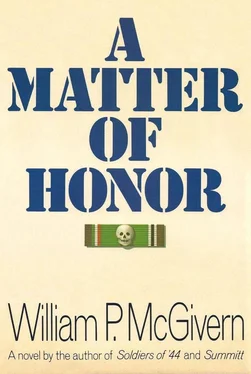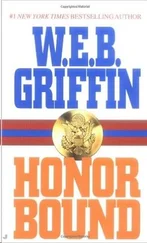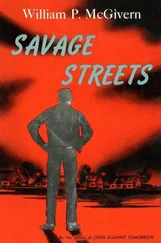The general swam a dozen laps in the Rhein-Baden pool, then took an icy shower in a stall fitted with crisscross jet sprays. In his third-floor room he opened the windows and looked out on the parks and graveled walks of the spa’s expansive grounds. It was not yet eight o’clock, and sharply cold, but a few of the healthier guests were out in jogging clothes and an elderly man and woman in wheelchairs, plaid robes tucked around them, were being pushed along by uniformed spa attendants under the bare linden trees.
Weir did a half hour of setting-up exercises, then sat down with a towel around his waist for a breakfast of fruit, boiled eggs and toast that had arrived from the room service on the same knock as the items from the pressing room. Fritz Vestrick was not yet in his office when Weir registered, but the desk clerk assured the general that Herr Vestrick would be informed of the honored guest’s presence the moment he arrived.
On the stroke of nine o’clock the phone rang and Vestrick’s voice, showing traces of a southern accent, said, “Hiya, Scotty! Am I coming up or are you coming down?”
“Give me five minutes, Fritz. I’ll be down.”
“Can’t wait to see you, pardner.”
Tarbert Weir put on his freshly pressed Class-A uniform, gray twill trousers, cordovan ankle boots with buckled straps, khaki shirt and tie and an olive drab tunic with three rows of campaign ribbons and decorations and the stars of a general. He checked the insignia on his garrison cap and slapped it across his knee to soften the folds. At the open window he took several deep breaths, then flexed his muscles so the fabric of the tunic stretched tight over his shoulders but moved with ease at the armpits. There was no need to look in the full-length mirror. Weir knew by the flex and stretch exactly how trim he looked.
Herr Vestrick’s office, opening directly off the lobby, was furnished in bleached leather, shining wood and circular carpets with patterns woven in varying shades of blue. In the background, from a tape cassette, came the throaty, sugared tones of Al Jolson singing “My Old Kentucky Home.”
The two men embraced and Vestrick motioned Weir to a chair while he seated himself behind the big desk. Vestrick nodded at the cassette player. “Just once through, Scotty, for old times’ sake. I had it transposed from the old seventy-eight.”
Vestrick was older than Weir by four or five years, a big man with high coloring. He wore the striped trousers and cutaway coat of a traditional boniface. He had been one of the first Luftwaffe pilots shot down over Britain after the United States’ entry into World War II, and had spent the next four years in prisoner-of-war camps in the deep South. After his release, Vestrick had returned to Frankfurt and was working as a busboy in the dining room at the Frankfurter Hof when Weir and Maggie had stopped there on their wedding leave. Weir had been impressed with the German’s fluent English, surprising accent and passionate love of the South. He had arranged for Vestrick to get work as a translator at the Am-Main Army Headquarters. The Jolson recording, now on tape, was one that Tarbert Weir had found in a second-hand record store near the Army College in Carlisle, Pennsylvania, and sent to Vestrick nearly twenty years ago.
On the last falling tones, Vestrick switched off the cassette and said, “I know about Mark, Scotty. I still subscribe to the Louisville Journal, they covered it under national news.”
For a moment Weir did not trust himself to speak.
“I already called you in Springfield,” Vestrick said, “but they told me you had gone to Virginia.”
“You talked to John Grimes?”
“No, a young lady. I didn’t ask her name.”
“A friend of Mark’s,” the general said.
“Helga wants you at the house for lunch, Scotty. It’s up to you, of course.” Weir shook his head. “I’ll do anything,” Vestrick said. “I’ve got fine staff here. I’ll take a few days off, we’ll go to the mountains, I’ll get drunk with you.”
Weir shook his head again. “That just won’t do it, Fritz. Not this time. There might be something, however. You still flying?”
“Yes, I keep an A36 Bonanza at the local airport.”
“What are you cleared for?”
“Almost everything. What do you want, Scotty?”
General Weir put his garrison cap on his head and held out his hand. “Thank you, Fritz. I’ll let you know later in the day.”
A cab took him to the headquarters of Belgium’s NATO mission in Germany, a three-story, salmon-colored building situated in the district of Wilhelmshohe, on the outskirts of the immense park which served as a frame for Ludensdorf’s elegantly restored summer palace.
Captain Alain Tranchet-LeRoi was waiting for his visitor in an office on the second floor of the building, a corner room with narrow, leaded windows which faced the park and the shining curve of a river in the distance.
Alain was tall, though not as tall as Weir had expected him to be, and stocky rather than muscular, not quite the athletic appearance the general had expected to see. He must be twenty-nine now, nearing thirty, the general thought, younger than Mark.
They had last met when Alain was eighteen. It had been his birthday and the general had visited him at the university with his mother to celebrate that and a prized soccer victory. Emile LeRoi had been in Holland on business that weekend, Marta had explained to her son. Alain had played for his district and now the university and there was talk that day about a tryout with a professional soccer team in South America.
It had been a festive afternoon, as Weir remembered it, idyllic and mannered, like an Impressionist painting, the college buildings of Louvain purple in the sunlight, the quads emerald green, the soccer field lined with picnic tables.
General Weir offered his hand and then patted Captain Tranchet-LeRoi warmly on the shoulder. “So good to see you, Alain, after all these years. I would not have been surprised if our appointment had been at a stadium somewhere, rather than the military.”
The captain smiled thinly, there was a touch of chill in his clipped careful English. “Establishment football was just a passing thing. I had a head for the game, no pun intended, but on the professional level I was outclassed. I think my father was more disappointed than I was.”
He lit a cigarette from the embossed leather box on his desk and walked to the windows. “My mother told me how glad she was to see you,” he said. “ ‘I feel almost young again, Alain’ was the way she put it.” He pinched the bridge of his nose, as if to relieve tension. “Christ! If we could give both generations prefrontal lobotomies it might be all to the good.”
“We all have our pasts to live with,” Weir said. “Marta’s and mine happened to cross.”
“Ah, yes, and our futures.” The Belgian gestured with his cigarette, sending a whirl of smoke through the office. “May I show you, sir?”
Tarbert Weir joined him at the window and looked down to the area in the parking lot at which the captain was pointing. He singled out a Belgian staff car, a Mercedes Benz 300 Diesel with black panels, brown fenders and heavy-duty tires. It carried NATO license plates and NATO and Belgian flags bolted to the bumpers. Tranchet-LeRoi’s smile was enigmatic, barely amused. “You couldn’t get that from a soccer player,” he said.
For the next ten minutes General Weir sat on one side of the desk while the captain spread out certain items between them. He was a chain smoker, and he sipped frequently at a coffee cup on his desk though the liquid was obviously cold. He must be more like his father than his mother, Weir thought; there was little of Marta’s vitality and warmth in his manner. The general was aware that the younger man was not meeting his eyes and that his face could have been that of a man of forty rather than a decade younger. There was a look of weariness in the lidded expression. Alain’s hair, while still full, was a fading ash blond, a shade away from gray.
Читать дальше












